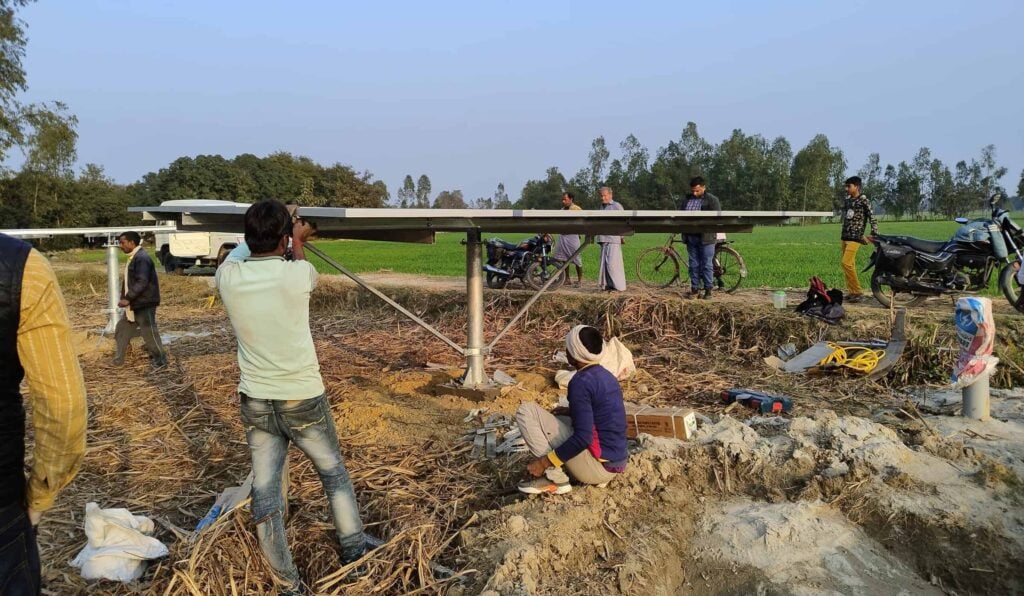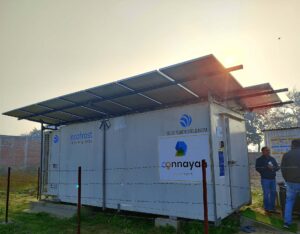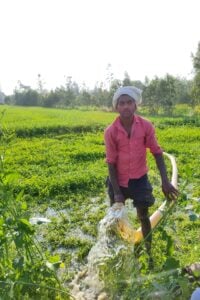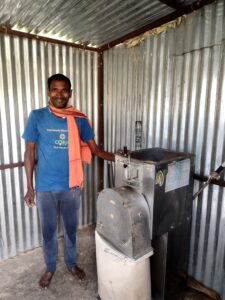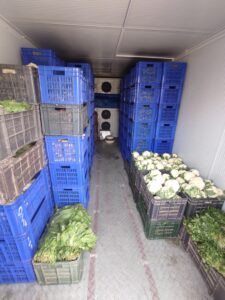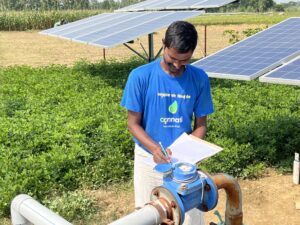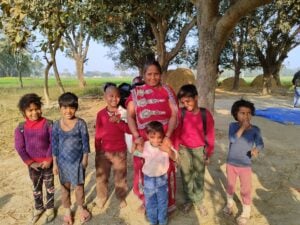Oorja Development Solutions Limited
Almost 90% of India’s farmers work on small or marginal sized farms on which they produce over half the country’s food. Facing high input costs and difficulty achieving economies of scale, their crop yields and profits have remained below potential. More importantly, these farmers are locked out of accessing cost-effective solar technology as the electric grid does not reach into farms and where it does, supply is erratic and of poor quality. This causes them to remain reliant on expensive and polluting diesel-based energy sources.
The lack of a separate feeder infrastructure for agriculture coupled with the lack of affordable, reliable energy sources for irrigation, post-harvest processing and refrigeration make it difficult for smallholder farmers to diversify into higher value crops, and 15-30% of their produce goes to waste. The low yields and incomes fuel a worsening agrarian and ecological crisis. In this situation, decentralised solar energy can help solve some of the problems of the rural poor.
There are government schemes that provide capital subsidies for decentralised solar-powered irrigation systems, but the high initial costs are an obstacle to farmers with limited budgets, landhold and social capital. The government schemes target mostly medium to large landholders with far more land than average. They instead increase the divide between small and large landholders, where smallholder farmers and their families face extreme poverty due to social and cultural barriers that limit their access to technology, asset ownership, and basic services.
Oorja believes that the core of sustainable food systems is resilient, productive livelihoods for thriving rural communities, and our portfolio of agri-energy services responds to the pressing needs of smallholder farmers. We own, operate and maintain decentralised solar infrastructure at the farm level, selling services in irrigation, milling and cooling to farmers who earn less than USD 100 a month. We are an inclusive, customer-centred business model that delivers critical farming services to smallholder farmers on a Pay-per-use basis, with no initial technology acquisition costs, and with all services sold at tariffs up to 50% lower than fossil-fuelled alternatives.
In contrast, the Pay-as-you-go (PAYG or PAYGo) model where consumers pay 10%-20% of the total upfront cost initially. The remainder is paid in regular instalments, or flexibly according to consumers’ seasonal income. PAYG models have helped to mainstream access to household solar appliances and small agri-appliances. However, as payments need to be recovered over a maximum period of 36 months, they are not suited for larger and more expensive solar infrastructure like water pumps or cold storage. The Pay-per-use model, however, enables Oorja to bridge the investment gap for agri-energy infrastructure and turns farming needs into services. Without any upfront investment barrier under this model, the poorest farmers can access ‘productive use’ appliances – making clean energy accessible, affordable, reliable and convenient.
A solar cold storage unit in the Bahraich district of Uttar Pradesh. These 5 tonne cold rooms can store over 30 types of perishable produce with a shelf life up to 400% higher.
Oorja is addressing the agrarian and climate crises in India by replacing diesel that’s used along the agrarian value chain with affordable farming services powered by solar energy. These solar assets comprise solar-powered pumps, mills and cold storage units, offered via three integrated agri-energy services as described below.
Oonnati is a Pay-per-use community irrigation service helping farmers transition from diesel-powered pumps to affordable, reliable solar-powered irrigation. The solar pump systems can deliver up to 250 cubic meters of water a day, sufficient for the year-round needs of 15 to 20 farmers on adjacent farmland. The water is metered using a flow meter and sold per cubic meter of water delivered, at a fixed tariff, irrespective of time of day or season. Tariffs are 20-40% lower than the running cost of pumping groundwater with diesel pumps (including the fuel, maintenance and rental costs).
A farmer in the Bahraich district of Uttar Pradesh using Oorja’s solar irrigation service, Oonnati
Oojjwal is a Pay-per-use community milling service available for grinding flour, pulses, spices and other dried produce into edible food products. Multipurpose pulverisers mill approximately 40 kilos per hour of wheat flour that can serve the needs of up to 100 households. The service is priced per kilo of produce milled at tariffs 25-50% lower than the market rates. The mills are integrated with the solar pumps that can power either the pump or the mill for higher use capacity. Usually the mills are run when the pumps are not in use, by diverting the solar power generated by the pumps’ solar cells. As the mills are conveniently located at the farm level in villages, the service also saves women farmers travel time and work in harvest processing activities.
A farmer availing of Oorja’s solar milling service, Oojjwal
Oonnayan is a Pay-per-use solar-powered community cooling service that makes 3 or 5 tonne solar cold storage rooms available for use by 50 or more farmers. The system is available at the market or farmgate for farmers to store their perishable produce. They pay per crate per day of produce stored, enabling them to extend the quality and shelf life of their products, reduce post-harvest losses and realise higher prices in the market. As the system is installed near the market gate, it lowers transport costs for farmers and helps them aggregate their produce. So far, these cold storage units have stored over 35 varieties of fresh produce, including carrots, litchis, pointed gourds and mushrooms.
Inside a solar cold storage facility in the Muzaffarpur district of Bihar.
Oorja has reached over 18,000 farmers since 2018, and increased their income by an estimated 50% to 100%. By April 2023, Oorja had 103 operational solar assets in five districts of Uttar Pradesh and two districts of Bihar. Being able to access year-round affordable irrigation has helped farmers diversify from staple crops to vegetables, fruits and herbs, while the cooling facilities have helped achieve a 400% higher shelf life for their produce. Oorja’s on-farm services also reduce farmers’ work and save time especially for women farmers. A complementary expert agronomy service has helped train over 800 farmers in modern, sustainable practices of agronomy, scientific input application, and crop diversification towards high-value, climate-resilient crops.
Our work has multidimensional impacts in energy access, clean energy, social development, job creation, gender equity, sustainable agriculture, food security, and nutrition, strengthening a number of SDGs. Our services address the following challenges and have had a direct impact on society:
- Access to energy and technology – Oorja has deployed 408.9 kWp of solar photovoltaic capacity generating 888.2 MWh of clean energy for the benefit of marginalised communities in underserved rural areas. This has accelerated access to modern clean energy for progress towards UN SDG 7 (affordable and clean energy).
- Mitigating emissions – By helping farmers transition from diesel to low-carbon solar energy we have reduced on-farm emissions (SDG 13). Two-thirds of our customers report that they no longer use diesel pumps, and we estimate that over 1,200 tonnes of CO2e emissions have been avoided to date.
- Lowering costs – As users pay only according to their consumption, their input expenditure has reduced by up to 60% compared to diesel, leading to direct cost savings of INR 3,000-6,000 per user annually, equivalent to 5-10% of annual income. Oorja’s services have helped them save INR 2,095,584 (USD 26,195) on fuel expenses, and the specialised agronomy training programs have helped them diversify their crops, expand from 2 to 3 growing seasons, increase their yields, reduce post-harvest losses, and build resilience to economic and climate shocks, increasing their farm incomes by an estimated 30-100%, for progress towards SDG 1 (No Poverty).
- Creating jobs – Oorja hires people from local communities to work as Operators to operate and maintain its agri-energy clusters, offering full-time gainful employment and added income generating opportunities. 33 jobs have been created so far, contributing to SDG 8 (decent work and economic growth).
A solar pump operator at a solar irrigation site. Operators are hired locally at the village level and trained to provide pay-per-use services in their communities
- Gender equality – Oorja addresses SDG 5 (gender equality) by delivering time-saving and hassle-free services to women and other marginalised farmers. We have also trained over 65 women as krishi sakhis (farm entrepreneurs) to improve their livelihood opportunities and their participation in decision making. Oorja is also hiring women as Operators and as Sales and Collections Assistants.
A woman farmer with her grandchild and children from the neighbourhood.
Oorja’s operations are currently centered in the northern Indian states of Uttar Pradesh and Bihar. In coming years, Oorja will expand its Pay-per-use services further and also add other business verticals in India, focusing on the states of Uttar Pradesh, Bihar, Jharkhand, Chhattisgarh, West Bengal and Odisha. It also plans to scale operations in weak-grid rural areas in South and Southeast Asia and Africa by partnering with local farmer collectives and development organisations.
These solutions, if scaled, can help increase food security, strengthen food systems, create jobs in last-mile communities, and abate 250 million tons of CO2e emissions each year. By 2026, Oorja aims to have installed 800 solar pumps, 200 solar mills and 50 cold storage units. We are working on closing a Pre-Series A blended finance round to help scale operations in existing and new markets in India and to expand our consumer base. Our vision is to empower 1 million farmers worldwide by 2030 with the agricultural services they need to sustainably increase their incomes and improve their quality of living.
















